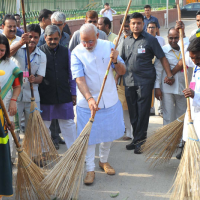Reform 03: A Toilet for Every Home and School by 2019
 Prime Minister Narendra Modi sweeping a street in Delhi (photo: PIB)
Prime Minister Narendra Modi sweeping a street in Delhi (photo: PIB)
It’s not every day that the prime minister picks up a broom and begins sweeping the street. But October 2 is no ordinary day. It’s the birth anniversary of Mahatma Gandhi, and Narendra Modi chose this national holiday to launch the Swachh Bharat Abhiyan (Clean India Mission), the most ambitious attempt ever made in India to clean the country and provide sanitation to every household within five years.
It is a daunting task. About 50 per cent of Indians still defecate in the open and the resultant faecal matter often contaminates groundwater resources, putting people at risk of cholera, diarrhoea, dysentery, hepatitis A and typhoid. According to the charity WaterAid, more than 186,000 children under five die every year from diseases caused by unsafe water.
According to the New York Times, there is a direct correlation between poor sanitation and malnutrition. A child raised in India is far more likely to be malnourished than one from the Democratic Republic of Congo, Zimbabwe or Somalia, the planet’s poorest countries. Stunting affects 65 million Indian children under the age of 5 years.
“The difference in average height between Indian and African children can be explained entirely by differing concentrations of open defecation,” said Dean Spears, an economist at the Delhi School of Economics. “There are far more people defecating outside in India more closely to one another’s children and homes than there are in Africa or anywhere else in the world.”
Ramanan Laxminarayan, vice president for research and policy at the Public Health Foundation of India, told NYT: “India’s stunting problem represents the largest loss of human potential in any country in history, and it affects 20 times more people in India alone than H.I.V./AIDS does around the world.”
The government wants every home and school to have access to a toilet by 2019, in time for the 150th anniversary of Gandhi's birth. The father of the nation was known to be finicky about cleanliness and hygiene, so what better way to pay tribute to the Mahatma than by launching a plan to clean India on his birthday, Modi asked. The prime minister promised that “we will have a country where there is not even a speck of dirt in our village, city, street, area, school, temple and hospital".
And he led by example: on Thursday morning he was seen with a broom in hand, sweeping clean a part of a street in Valmiki Nagar, the largest sweeper colony in Delhi.
According to BBC News, India's four million federal government staff were "requested" to come to work by 9 am on Thursday and take a "cleanliness pledge", promising to devote at least 100 hours every year - or two hours a week - to cleaning up. They were expected to then pick up a broom and begin cleaning their offices and toilets.
But the government’s decision to make all its staff work on Thursday has not gone down well with everyone, since Thursday was meant to kick off a five-day holiday weekend, with the Hindu festival of Dussehra falling on Friday and the Muslim festival of Eid on Monday.
"A lot of the staff are resentful at missing out on the long weekend - people had made holiday plans in advance, booked flights and train tickets," an unnamed senior bureaucrat told the BBC.
Building a toilet for every home and school is expected to cost around 620 billion rupees ($10.3 billion) - the government has earmarked 146 million rupees ($2.4 million) and expects to get the remaining amount from the corporate sector and international development organisations.
But just building toilets is not enough, with several areas in its cities having been turned into open urinals, and towns choking under mounds of garbage. Many rivers, including the sacred Ganga, have been turned into open sewers, with raw sewage from homes and factories being emptied directly into it. Most Indians also don't think twice before littering and spitting in public.
A complete change in societal attitudes is required. And Modi’s move to bring sanitation to the front of the nation’s consciousness might just do the trick.
- Karan Singh
To Learn More:
Modi aims to shake up sanitation with Clean India drive (by Rupam Jain Nair, Reuters)
Indian officials ordered to take up brooms on day off (by Geeta Pandey, BBC News)
Poor Sanitation in India May Afflict Well-Fed Children With Malnutrition (by Gardiner Harris, New York Times)
15 diseases India can stamp out by improving sanitation (by Sanchita Sharma, Hindustan Times)
India's 'toilet guru' works to flush away open defecation (AFP)
- Top Stories
- Controversies
- Where is the Money Going?
- India and the World
- Appointments and Resignations
- Unusual News
- Latest News
- India College Chain’s Expansion into U.S. Draws Opposition from Massachusetts Officials over Quality of Education
- Milk Shortages in India Tied to Release of New Movies Featuring Nation’s Favorite Stars
- Confusion Swirls around Kashmir Newspaper Ban in Wake of Violent Street Protests
- Polio-Free for 5 Years, India Launches Vaccine Drive after Polio Strain Discovery
- New Aviation Policy Could Increase Service, Lower Ticket Prices






Comments